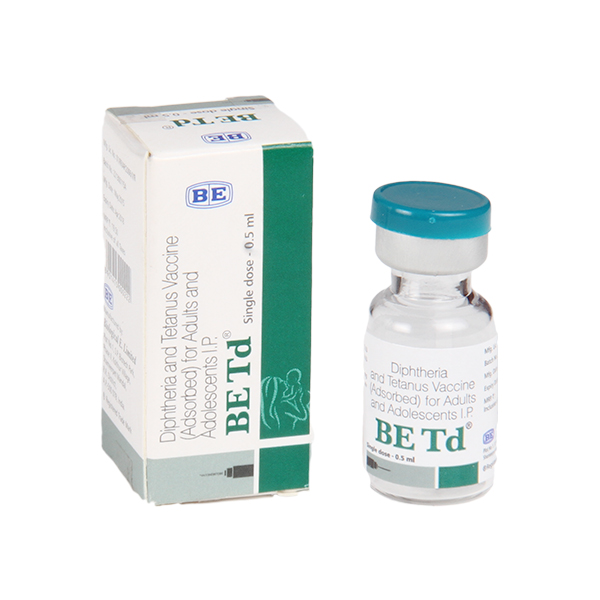The TD Vaccine Against Tetanus and Diphtheria
Introduction: The TD vaccine, short for Tetanus and Diphtheria vaccine, is a vital tool in preventing these potentially deadly infections. In this comprehensive guide, we’ll explore the importance of the TD vaccine, how it works, and why it’s a crucial part of public health.
Understanding Tetanus and Diphtheria
The Silent Threats: Tetanus and Diphtheria Unveiled
The Tetanus Menace:
Tetanus, often referred to as “lockjaw,” is a bacterial infection that affects the nervous system. We’ll delve into how it enters the body, its symptoms, and the serious consequences it can bring.

Diphtheria’s Grip:
Diphtheria is a highly contagious bacterial infection that can affect the respiratory system. We’ll explore its transmission, symptoms, and the importance of vaccination in its prevention.
The Role of the TD Vaccine
Shielding Against Tetanus and Diphtheria: How the TD Vaccine Works
Vaccine Components:
The TD vaccine combines protection against tetanus and diphtheria. We’ll explain how it achieves this by introducing inactivated toxins into the body.
Strengthening Immunity:
Detail how the TD vaccine prompts the immune system to recognize and build defenses against these toxins, ensuring protection in case of exposure.
Vaccination Schedule
Timing Is Key: When and How Often to Get the TD Vaccine
Primary Series:
Explain the initial vaccination schedule, including when children should receive their first doses of the TD vaccine.
Booster Shots:
Discuss the importance of booster shots for maintaining immunity and guide when and how often individuals should receive them.
Who Should Get Vaccinated
Protecting Communities: Target Populations for the TD Vaccine
Children and Adolescents:
Highlight the importance of childhood vaccination against tetanus and diphtheria and the schedule recommended by healthcare authorities.
Adults and High-Risk Groups:
Explain why adults, especially those with specific risk factors or occupations, should also receive the TD vaccine to ensure ongoing protection.
Benefits and Risks
Weighing the Pros and Cons: Understanding TD Vaccine Benefits and Risks
Benefits of Vaccination:
Detail the numerous advantages of getting vaccinated with the TD vaccine, including the prevention of serious infections.
Rare Risks and Side Effects:
Address any potential risks or side effects, emphasizing their rarity and the overall safety of the vaccine.
TD Vaccine and Natural Language Processing
Harnessing Data: The TD Vaccine and the Power of Natural Language Processing
Analyzing Vaccine Data:
Explain how natural language processing (NLP) is used to analyze vaccine-related data and trends, contributing to public health research and decision-making.
Stay Informed:
Encourage readers to stay informed about vaccine-related information and the role of NLP in ensuring the safety and effectiveness of vaccines.
Common Symptoms of Tetanus and Diphtheria
Recognizing the Red Flags: Common Symptoms of Tetanus and Diphtheria
Symptoms of Tetanus:
Describe the typical symptoms of tetanus, including muscle stiffness, jaw pain, and difficulty swallowing, to help readers recognize early signs.
Symptoms of Diphtheria:
Explain the common symptoms of diphtheria, such as a sore throat, fever, and breathing difficulties, to raise awareness about this infection.
FAQ About td vaccine
1. Q: What is the TD vaccine, and what does it protect against?
A: The TD vaccine, or Tetanus and Diphtheria vaccine, protects against tetanus and diphtheria, two serious bacterial infections.
2. Q: How does the TD vaccine work?
A: The TD vaccine works by introducing inactivated toxins from tetanus and diphtheria bacteria to stimulate the immune system to produce antibodies for protection.
3. Q: Who should receive the TD vaccine?
A: The TD vaccine is recommended for children, adolescents, and adults. Booster shots may be necessary to maintain immunity.
4. Q: What is the vaccination schedule for the TD vaccine in children?
A: Children typically receive a primary series of TD vaccinations starting in infancy, with booster shots recommended as they grow.
5. Q: Are there specific groups or occupations that should prioritize TD vaccination?
A: Yes, certain high-risk groups, such as healthcare workers and travelers to regions with diphtheria outbreaks, should prioritize TD vaccination.
6. Q: Are there any side effects of the TD vaccine?
A: Side effects are generally mild and include soreness at the injection site. Severe reactions are rare.
7. Q: What are the symptoms of tetanus and diphtheria infections?
A: Tetanus symptoms include muscle stiffness and difficulty swallowing. Diphtheria symptoms include a sore throat and fever.
8. Q: Can the TD vaccine prevent tetanus and diphtheria if administered after potential exposure?
A: The TD vaccine can provide some protection if administered after exposure, but it’s essential to seek medical attention in such cases.
9. Q: Is the TD vaccine safe during pregnancy?
A: The TD vaccine is generally safe during pregnancy and may be recommended if there’s a risk of exposure.
10. Q: How does natural language processing (NLP) contribute to vaccine-related research?
A: NLP helps analyze vast amounts of vaccine-related data, assisting in monitoring safety, effectiveness, and trends in vaccine use.
Conclusion:
Summarize the vital role of the TD vaccine in preventing tetanus and diphtheria, emphasizing its contributions to public health. Reiterate the safety and effectiveness of the TD vaccine, addressing common concerns and misconceptions.




